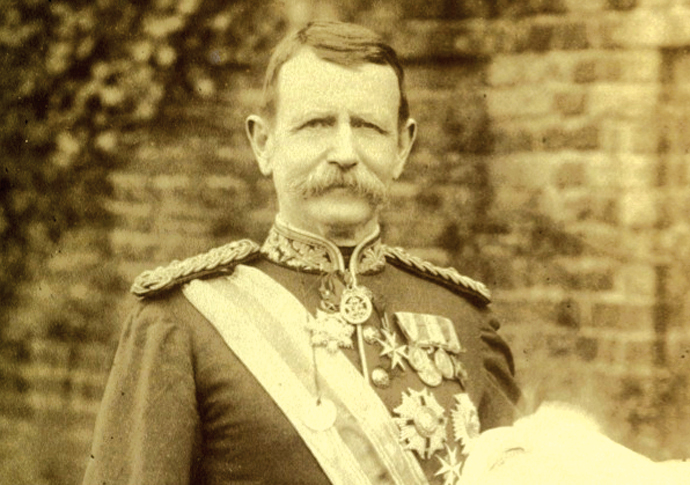Berk’s law: when burglars and thieves ‘had a really good time’
In the latest in his series on eminent Victorians, Neil Titley considers the troubled career of Met Police Commissioner, Sir Charles Warren
Friday, 28th November 2025 — By Neil Titley

Sir Charles Warren [Elliott and Fry]
THE post of Commissioner of the Metropolitan Police has never been an easy job, as Dame Cressida Dick and Sir Ian Blair might testify. Both of them lost the confidence of their respective Mayors Sadiq Khan and Boris Johnson, and were forced to resign. However, they retired with rather more dignity than a previous holder of the office, General Sir Charles Warren (1840-1927).
Described by Robert Cunningham-Graham as “a psalm-singing, sanctimonious swashbuckler”, Warren’s tumultuous career started rather quietly. As a British Army engineer, he was able to excavate the Temple Mount in Palestine and discovered a Bronze Age water conduit, today known as “Warren’s Shaft”.
At that time the Metropolitan Police Commissioner was selected from the military, and by 1886 Warren found himself transferred from the Army to Scotland Yard. Known as an arrogant man, he did not endear himself to his constables when he insisted that they underwent military drill, while kitting himself out in ever more extravagant dress uniforms.
One of Warren’s executive decisions was to order that all dogs not muzzled or on a lead (even if accompanying their owner) should be considered potentially rabid and therefore seized by police and destroyed. In so doing, he roused the wrath of the English in a way few other issues could.
Not least was the open goal he offered to criminals in other fields. A newspaper reported the views of one London burglar: “Lawks, sir, since Sir Charles Warren got the dawg craze into his head, burglars and thieves in general have had a really good time. The Force don’t pay any attention to us. Their energies is all directed to pleasing the Chief by stealing the taxpayers’ dawgs!”
On November 13, 1887, not for the first time and certainly not the last, a demonstration was held in Trafalgar Square. It was a protest against rural deprivation in England and, with the authorities determined to stop it, Warren placed 4,000 police in the square, backed up by 700 troops in reserve on the steps up to the National Gallery.
The protesters arrived along various approach streets but were attacked as they marched in. Two died in the fighting, 100 more were hospitalised, and 77 constables were wounded. It proved to be possibly the most brutal incident that the square has ever seen and became known as “Bloody Sunday” – the London version. Warren’s popularity plummeted.

Charles Warren as seen by Vanity Fair in 1886
Incidentally, during the battle the conductor of a bus from Charing Cross, en route to the West End, decided instead to offer circular sight-seeing trips of the square at two pence a head and did a roaring trade. One man stayed on for six trips and remained unscathed through the thickest of the fighting.
Notwithstanding this debacle, Warren remained in position until 1888 when he placed himself in charge of the hunt for the serial murderer Jack the Ripper. This investigation saw more than 2,000 people interviewed, 300 investigated, and 80 detained. Despite this, the hunt revealed nothing. Undaunted, he decided to make the use of bloodhounds the main instrument in the chase. He invited the press and the public to witness an experiment in Hyde Park to test the capabilities of his hounds.
Unwisely deciding to use himself as the quarry, he unleashed the dogs. They promptly vanished in pursuit of anything they fancied. The public display of the Metropolitan Police Commissioner running around Hyde Park and losing his bloodhounds in the process caused endless official embarrassment. When all his efforts were crowned by the news of yet another Ripper murder, Warren bowed to the inevitable and resigned.
Unfortunately, he had issued strict instructions that if another murder occurred no one should examine the scene of crime until he arrived. The local police had not been informed of his resignation and therefore it was several hours before anyone dared to approach the vicinity of the Ripper’s latest atrocity.
Returning to the British army, despite his age (59) and his reputation as having a “disagreeable temper”, Warren was given command of a division during the Boer War of 1899.
Having bungled the second attempted relief of Ladysmith, he moved on to tackle the Boer guerrillas in the field.
Spotting that the hill of Spion Kop was the tallest in the region, he sent his force to climb it, in the hope that this would give them the advantage of firing down on their enemy from above.
Regrettably, he sent them off at night and into a dense mist. This resulted in them getting lost and climbing a hill that was actually lower than the Boer position.
During the resulting Battle of Spion Kop, 243 British troops died and over 1,200 were wounded or captured.
Also, with the rout of the British Army by untrained Boer farmers, Warren had created an international public relations disaster and was recalled to London.
He has had a posthumous career as a character in several Jack the Ripper / Sherlock Holmes-inspired films, variously played by Anthony Quayle, Hugh Fraser, and Ian Richardson.
• Adapted from Neil Titley’s book The Oscar Wilde World of Gossip. See www.wildetheatre.co.uk. Available at Daunts, South End Green